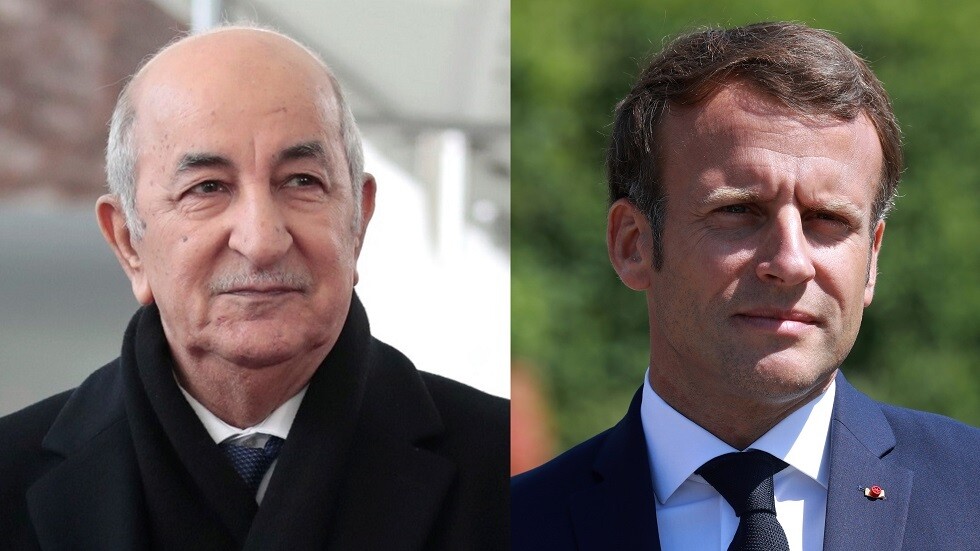With President Emmanuel Macron at the helm of the government in France, the historical narrative has become an important factor in Algerian French relations, in part because for the first time, both countries are governed by presidents who did not personally witness, or take part in, the Algerian War. While Macron kicked off his presidency with moves that were seen as aiming to ease the tension between the two countries regarding the latter’s colonial legacy in Algeria, things have taken a different turn. Algeria continues to demand that France acknowledge its responsibility for the loss of more than five million Algerian lives, while France insists on refusing to apologize for its colonial crimes in Algeria. Consequently, relations between the two sides have fluctuated, and tensions escalated following Macron’s statements in early October describing the Algerian regime as “tired and exhausted” . Macron also criticized what he called the “falsification” of Algerian history stemming from a “hatred of France,” and went on to question the existence of an Algerian nation before French colonialism. Algeria considered these statements an “unacceptable insult,” and immediately responded by summoning its ambassador to Paris and closing Algerian airspace to French military planes bound for the Sahel as part of Operation Barkhane.
Pivotal issues
The escalation of Algerian French tensions has raised questions regarding the future of relations between the two countries, and repercussions on complex strategic issues, especially bilateral military cooperation.
Tensions are centered around a number of issues, including:
The Colonial legacy: Tensions between the two countries date back to February 2005, when the French Parliament passed a law recognizing the “positive role of colonialism.” Although the law was later repealed, the issue resulted in the nullification of the friendship treaty between France and Algeria, which was signed by the late French President Jacques Chirac and his Algerian counterpart Abdelaziz Bouteflika. Although Macron was the first to acknowledge in September 2018 France’s colonial past of nearly six decades ago, and the regime of systematic torture it enforced against Algerians during the Algerian War (1954-1962), he refused to apologize for those crimes.
In July 2020, French historian Benjamin Stora was commissioned to prepare a report on the French colonial legacy in Algeria, containing recommendations to strengthen Algerian-French relations. That same month, France returned to Algeria the remains of 24 Algerian heroes of the popular resistance who died during the French occupation. The report presented by Stora to the French presidency on January 20th, 2021, was criticized by the Algerians for Stora’s failure to include a recommendation that France should present an apology for its practices in Algeria during the colonial era.
The Algerian “Hirak”: In May 2020, tensions between the two sides renewed, as Algeria recalled its ambassador to France following the broadcast of a documentary film on the Algerian “Hirak”, or protest movement, on official French channels. A scheduled visit by French Prime Minister Jean Castex to Algeria in April was postponed indefinitely, only two days before it was scheduled to take place, at Algeria’s request. The postponement of the visit, which would have contributed to advancing a rapprochement, reflected the differences between the two countries on a number of issues, including the issue of the Algerian protest movement. The ruling Algerian elite objected to French media’s “support” of this movement of popular protest, and therefore chose to deprive it from using Castex’s visit to cast further light on the movement.
The Western Sahara issue: This issue is central to the tension between Algeria and France, which was reflected in the fact that Macron’s party – La République en Marche! – announced on the day Castex’s visit was cancelled the formation of a support committee in the city of Dakhla in Western Sahara, the majority of which is under Moroccan control. Algeria, which supports the Polisario Front, considered this to be crossing a red line, perhaps viewing it as an indication the party may recognize Moroccan sovereignty over the Sahara.
Eye on elections: As French presidential elections, scheduled for April 2022, draw near, Macron’s need to counter the growing influence of the extreme right-wing rhetoric in France, may be a driver of his stances towards Algeria. The presidential decision to tighten visa requirements for Algerian, Moroccan, and Tunisian citizens, issued on September 28th, is an illustration of this link, as it was issued only hours before Marine Le Pen, the leader of the far-right National Rally party, intended to announce her immigration plan. It is worth noting that tensions between France and Algeria only escalated during the last year of Macron’s term.
Determinants of cooperation
It is likely that two important factors will influence the trajectory of French Algerian relations going forward, which are:
- Economic cooperation: There is speculations regarding the possibility of a decline in economic relations between the two countries against the backdrop of the political crisis between them. It has been noted that some large French companies lost their position in the Algerian market, and other companies, including Renault, have faced some restrictions on their activities. However, experts view the possibility that the political differences between the two countries will cast a shadow on the economic relations between them as unlikely. They believe the troubles faced by some French companies in Algeria to be the result of other factors.
Algeria is an important economic partner for France. The value of trade between the two countries amounted to EUR 6.9 billion in 2020, and France ranked second after Italy in Algeria’s total exports for the same year, at 13.3 percent. French direct foreign investments in Algeria were estimated at EUR 2.9 billion, in third place to the United States and Italy. French investments in Algeria are concentrated in key strategic sectors, namely financial and insurance activities, manufacturing (automobiles, pharmaceuticals, food industries, and chemicals), and extractive industries. - Military cooperation: This is one of the most complex issues in the relations between the two countries. Algeria’s decision in October to close its airspace to French military aircraft heading to the Sahel region as part of Operation Barkhane created a rift in the military cooperation between the two countries. France uses Algerian airspace to provide support for its ground forces, estimated at 5,000, in the Sahel region. Although France can resort to alternative air routes through Morocco or Libya, they do not replace Algeria’s strategic weight in the Sahel-Saharan region, which has made it an important partner for France in combating terrorism and other threats in the region.
Moreover, Tebboune’s statements to German newspaper Der Spiegel, on November 6th, alluding to possible Algerian military intervention in Mali was an uncharacteristic move for Algerian foreign policy, and cast a dark shadow on the future of military cooperation with France. Observers believe these statements may exacerbate tensions with France, who may perceive it is the target of these declarations. Mali is important for French economic interests in the resource rich African Sahel region. It has, since the colonial era, regarded Mali as part of the French sphere of interest. Tensions between the two countries may therefore escalate, if serious steps are not taken to mend the rift and defuse the crisis.
Future Scenarios
It can be argued that French Algerian relations could either escalate or ease, in line with two possible scenarios. The first scenario regards further escalation of tensions as possible, in view of competition for electoral votes in the upcoming presidential elections scheduled for next June, and the possibility that one of the far-right candidates could win.
The second scenario projects the easing of tensions and a possible reconciliation between the two countries and is viewed as the most likely scenario. It would be unwise for France to escalate tensions with Algeria, as this would open the door to other competing international powers to strengthen relations with the latter. France would be particularly concerned in view of French-Turkish rivalry in North Africa, and France’s need of Algeria’s cooperation to continue its efforts to combat terrorism in the Sahel region. Moreover, with the French presidential elections approaching, Macron will not want to lose the votes of the large Algerian community in the country, which stands at nearly five million. In the end, the future of relations between the two countries will be determined by the strength of political will on the part of a political elites on both sides to move forward with reconciliation, and to prioritize the mutual interests between them.


